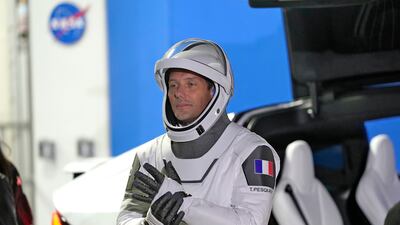Crew members on the International Space Station have always risen above geopolitical tensions on the ground and focused on their work, French astronaut Thomas Pesquet has said.
Former ISS commander Mr Pesquet, 44, who spent six months there last year, was speaking at the France pavilion at Expo 2020 Dubai on Friday.
He said he believes that collaboration on the ISS will continue, despite the unprecedented times the space sector is facing after Russia’s invasion of Ukraine.
But he also cautioned that current events made people think about the future.
“We are all on the same boat on board the space station. We’re working and there are no tensions or divisions,” Mr Pesquet, who last year became the first European to travel on Elon Musk's SpaceX Crew Dragon spacecraft, said.
“It’s important because it’s safety that is at stake. Of course, current events makes us wonder what the future will be.
“But I always found that the space station is great example to show that people manage to work together, even those who don’t speak the same language, come from different countries and have different histories.”

There are currently seven astronauts in the floating laboratory — four Americans, two Russians and one German. Three more Russian cosmonauts are due to launch to the station on March 18.
The ISS — built upon a partnership between the US, Russia, the European Space Agency, Canada and Japan — has had crews composed of different nationalities throughout its 20-year history.
It had been shielded from political tensions until recently. But in retaliation for western sanctions against Russia over its invasion of Ukraine, Russian space chief Dmitry Rogozin suspended scientific co-operation with Germany on the ISS.
However, US space agency Nasa has confirmed that all other operations there remain “normal”.
The EU has placed tough sanctions on Russia, including ones affecting its space programme.
Recently, the ESA suspended the ExoMars mission, which was being built in partnership with Russian space agency Roscosmos. It was scheduled to launch on a Russian rocket this year.
Riding in Crew Dragon
At the Expo, Mr Pesquet also spoke about travelling in the Crew Dragon spacecraft for the first time. He flew in the Russian Soyuz spacecraft in 2016.
“Those are two completely different vehicles. Soyuz is from the 1960s and the Crew Dragon is brand new,” he said.
“But, the physical principles are the same — there’s not so many different ways to send something into space.
“Inside the capsule, it’s the same difference between a new and an old plane. Crew Dragon has big, flat screens, very automated and a very sleek design.”
He said that European astronauts would continue flying in the Dragon because of agreements between the ESA and Nasa.
“It’s kind of a consequence of Nasa having this new capacity to send people up to the space station. We were going to fly on the Crew Dragon anyway, and it’s unrelated to the current events.
“So, you’ll mostly see European astronauts on the Crew Dragon in the future.”
Only Russia, the US and China have the capability to launch astronauts into space.
Europe has always relied on the US and Russia to launch its astronauts, but the ESA is hoping to set goals for its own independent launch programme.














